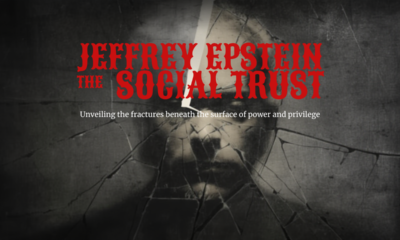Civilization
The World Court’s One-Sided Opinion Will Not Advance Peace
The International Court of Justice issued a one-sided opinion that revises history and will not advance peace in the Middle East.

Last Friday, the International Court of Justice in The Hague published its Advisory Opinion on “the Legal Consequences Arising from the Policies and Practices of Israel in the Occupied Palestinian Territory including East Jerusalem.”
Nature of World Court advisory opinions
Seated in the prestigious Peace Palace, (financed before WWI by the American philanthropist Andrew Carnegie), the ICJ is known as “the World Court”. It comprises fifteen judges from most geographic regions and legal traditions. None of the judges is free of prejudices, especially when it comes to the Israeli-Palestinian conflict. The current President of the Court, Nawaf Salam, is a Lebanese former diplomat who has attacked Israel in the United Nations. As Lebanon’s ambassador to the UN, Salam voted for numerous resolutions against Israel. The current US judge is Prof. Sarah Cleveland (Columbia).
The Court issues “Advisory Opinions” when requested by UN bodies, such as the General Assembly. They do not bind the UN or its member states. The Court also does not speak with one voice; each judge can express a different opinion. Advisory Opinions are therefore not decisions, they are more akin to a set of non-binding opinions expressed by a diverse group of experts.
Calling on Israel to commit national suicide
A majority of members of the Court concluded that “Israel’s presence” in the so-called “Occupied Palestinian Territory” is illegal, and that Israel must “bring to an end its unlawful presence in the Occupied Palestinian Territory as rapidly as possible”. Additionally, Israel is obliged to “evacuate” all Israeli “settlers” from the OPT, and to allow the return to their original place of residence of “all Palestinians displaced during the occupation”.
According to the majority, Israel must withdraw from the territories without any guarantees regarding its own security, which is a crucial element for lasting peace. These judges blatantly disregarded UNSC Resolution 242 (1967) which acknowledged Israel’s “right to live in peace within secure and recognized borders”. Moreover, for Israel to carry out these recommendations would be outright suicide.
To reach this view, the majority had to ignore the concerns expressed by several Western-oriented states, including the USA, who argued that the Court should refuse to answer the General Assembly’s questions. Instead, they adopted – without serious or independent analysis – the one-sided historical and legal narrative promoted by the Palestinians and supported by a minority of anti-Western (mainly Arab/Islamic) UN member states – a narrative that does not reflect the realities on the ground and misrepresents international law. The influence of the President of the Court in all of this is unmistakable.
Historical revisionism
Under this narrative, the sole issue to be resolved is to make sure that the Palestinians have a state. The Jewish people have no historical connection with the land; the Jews are outsiders, and in 1967 it was not the Arabs who were attacking Israel, but Israel that took Palestinian territory by force.
This is historical revisionism of the highest order. But the Court was easily able to do so because the General Assembly asked the Court to assume Israel’s “ongoing violation” of the Palestinian people’s right to self-determination.
A minority of the fifteen judges (from Slovakia, Romania, France, and Uganda) saw through this charade and slammed the majority’s lack of sound historical and legal analysis. In her Dissenting Opinion, Ugandan Vice-President Julia Sebutinde underscored the need to consider the complex history of the conflict, the security threats faced by Israel, and the competing territorial claims of the parties in the British Mandatory Palestine.
Sebutinde was furious about the Court’s refusal to recognize the deep connection of the Jewish people with the land going back many centuries, as recognized in the British Mandate for Palestine.
By denying Jewish connection with the land, the majority advocate that the West Bank and East Jerusalem should become a Jewish-free (judenrein) zone (Gaza already was before October 7th). In fact, by demanding the separation of Jews from Arabs, the Court is thus promoting a kind of apartheid regime – which is ironic, because the Court accuses Israel of apartheid.
The Court undermines the peace process
The majority also are undermining the peace process. In their view, the legal framework provided by the Oslo Accords, which govern the relations between the parties and impose an obligation to settle their remaining issues at permanent status through bilateral negotiations, should be ignored. The Palestinians’ self-determination rights cannot be derogated from, and the Oslo Accords, therefore, cannot authorize Israel to “maintain a permanent presence in the Occupied Palestinian Territory for [its] security needs”.
This is problematic because it is rooted more in wishful thinking than the realities on the ground. It is likely most of the judges have never visited Israel. If they did they would realize that the Samarian Highlands (the central part of the West Bank) provide a significant elevation advantage. From these heights, there is a clear line of sight to key areas in Israel, including the densely populated coastal areas where Tel Aviv and the Ben Gurion Airport are located. If hostile forces were to gain control of these areas, they easily could launch rockets and artillery into those targets and other critical infrastructure for Israel making them extremely vulnerable to devastating attacks, even from low-range weapons like mortars.
Reject the Advisory Opinion
This unrealistic Advisory Opinion will not promote peace, but further destabilize the region and escalate the ongoing armed conflict. It will embolden Israel’s enemies, notably Hezbollah and Iran, to attack Israel under the guise that the ruling provides them with a strong legal justification for those attacks.
This article was originally published by RealClearWorld and made available via RealClearWire.
Andrew Tucker is the Director General of The Hague Initiative for International Co-Operation.
-

 Civilization5 days ago
Civilization5 days agoWhy Europe Shouldn’t Be Upset at Trump’s Venezuelan Actions
-

 Christianity Today5 days ago
Christianity Today5 days agoSurprising Revival: Gen Z Men & Highly Educated Lead Return to Religion
-

 Civilization3 days ago
Civilization3 days agoTariffs, the Supreme Court, and the Andrew Jackson Gambit
-

 Civilization3 days ago
Civilization3 days agoWhy Europe’s Institutional Status Quo is Now a Security Risk
-

 Civilization4 days ago
Civilization4 days agoDeporting Censorship: US Targets UK Government Ally Over Free Speech
-

 Executive3 days ago
Executive3 days agoWaste of the Day: Wire Fraud, Conflicts of Interest in Connecticut
-

 Civilization3 days ago
Civilization3 days agoEpstein and the destruction of trust
-

 Civilization2 days ago
Civilization2 days agoTrump Lashes Out at Supreme Court as Under ‘Foreign Influence’














